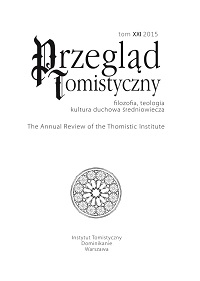De ente et essentia mathematicorum.
“De Ente Et Essentia Mathematicorum”.
Selected Elements of the Philosophy of Mathematics of Saint Thomas Aquinas
Author(s): Bartłomiej KołodziejczykSubject(s): Philosophy of Middle Ages, Philosophy of Science
Published by: Instytut Tomistyczny
Keywords: philosophy of mathematics; category of quantity; discrete quantity; continuous quantity; number; geometry; filozofia matematyki; kategoria ilości; ilość dyskretna; ilość ciągła; liczba; geometria
Summary/Abstract: Mathematics studies objects such as numbers, sets, points, lines and plane figures. Since the time of the Pythagoreans, philosophers have pondered the nature of these entities. Although Aquinas adopted many of Aristotle’s views on these matters, he also made his own contributions to the philosophy of mathematics. The aim of this paper is to examine the answers that Aquinas gives to two major problems in this area, namely, what is number and what is the relationship between mathematical entities and reality. The first of these issues is dealt with in section one. The result is as follows: number (as such) is a species of discretequantity; it is multitude measured by one. One is a principle of number: its “constituent” and unit of measurement. A particular number, such as the number 7, is a species of number. The specific difference that distinguishes it from other numbers is the last unit that builds it. Section two is devoted to the problem of the relationship between mathematics and reality. The present state of research doesn’t provide a clear and unequivocal solution to this problem. It is widely accepted that Aquinas doesn’t deem mathematical objects purely mental constructs, since their existence depends on matter. Their definitions, however,do not include matter due to the fact that the entities in question are considered in an abstract way. Many scholars add that, in Aquinas’ view, mathematical objects are not entirely real. Rather, they are partly constructs of the human mind.
Journal: Przegląd Tomistyczny
- Issue Year: 2015
- Issue No: XXI
- Page Range: 509-523
- Page Count: 15
- Language: Polish

